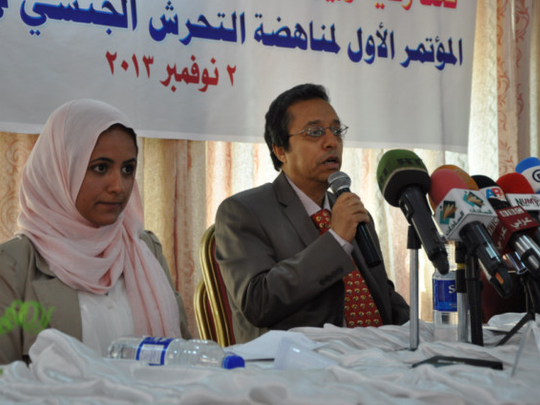
Sana’a: Yemeni activists are urging tougher implementation of a law against sexual harassment. Failure to implement the law has led to widespread cases of abuse throughout the country, according to activists speaking at a conference on Saturday.
The conference, which is the first of its kind, was tackling the pressing issue of sexual harassment in Yemeni society. Participants agreed that one of the reasons behind the growing number of cases is the absence of ‘deterrent’ penalties. “There are many loopholes in the current Penalty Law. It imposes a 1,000 Yemeni riyal (Dh17) fine and six months in prison as maximum penalty for harassment. This punishment is not a deterrent and is not commensurate with the gravity of sexual harassment,” Yahya Al Sakhi, a lawyer, told Gulf News. “There is a new modified penalty law that will be discussed in the parliament soon. I call upon all youth to contact their MPs to drum up support for changing the current law.” he added.
Responding to criticism, Mohammad Al Mikhlafi, Minister of Legal Affairs, told the participants that his ministry does not mind amending the law if studies show that it is not strong enough to control sexual harassment.
“We are ready to adopt the recommendations of this conference if found that the current law does not prevent the phenomenon,” he told Gulf News.
In addition to attributing the phenomenon to political, social and economical reasons, the minister did not rule out the possibility of involvement of some religious groups in the spread of harassment.
“[Religious groups] are trying to impede women’s participation in society. This role has occurred in some countries and we are waiting for studies to determine if they are behind the increase in sexual harassment in Yemen,” he said.
“I have attended many workshops and read many small studies about sexual harassment for ten years which all show that the phenomenon exists in many cities,” Fuad Al Salahi, sociology professor at Sana’a university, told Gulf News. Having conducted a study on sexual harassment in Sana’a, Al Salahi identified many reasons for the phenomenon. “The reasons are the youth’s poor adherence to religious and social values, lack of a deterrent law, sexual repression and lack of NGOs that support women,” he said.
The conference was organised by the Safe Streets Campaign, a group of youth activists. It brought together security experts, government officials, lawyers, civil society and media representatives to discuss sexual harassment. “In our first anti-harassment campaign in 2011, we discovered that harassment was largely overlooked in the country, so we wanted to highlight the issue by organising the conference as the first step towards supporting victims of sexual harassment,” Ghaidaa Al Absi, director of the Safe Streets Campaign and co-organiser of the conference, told Gulf News.
“Safe Street Campaign organised many activities that aimed to break silence about this issue. We initiated a blog in order to record stories of those women and children who were sexually harassed. We managed to get some stories even though most of the women wrote under under pseudonyms,” Ghaidaa said.
Ghaidaa is particularly proud of securing the minister’s pledge to amend the Penalty Law. “We are working with some lawyers to draft a law and will present it to the minister of legal affairs who pledged to change the current law.”
Since its inauguration in 2011, the Safe Street Campaign has created an electronic map and a hotline for receiving and recording stories about sexual harassment.
“When we hear about a woman being harassed, we first begin to verify the case and then supporting her until she gets justice.”
Giving a security perspective on the issue, Colonel Abdul Gani Al Wajih, the former commander of patrol police in Sana’a, said that victims’ reluctance to report harassment cases encourages offenders to attack more people. “In the last ten years in my profession, I discovered that harassment continues because offenders do not believe they will be punished,” he told Gulf News. “Once we arrested 115 men in a park in Sana’a who were trying to flirt with women. We decided to shave their heads as a punishment and as a result the number of harassers dropped to nine the following day. This shows that tough laws can stop sexual harassment,” he added.












